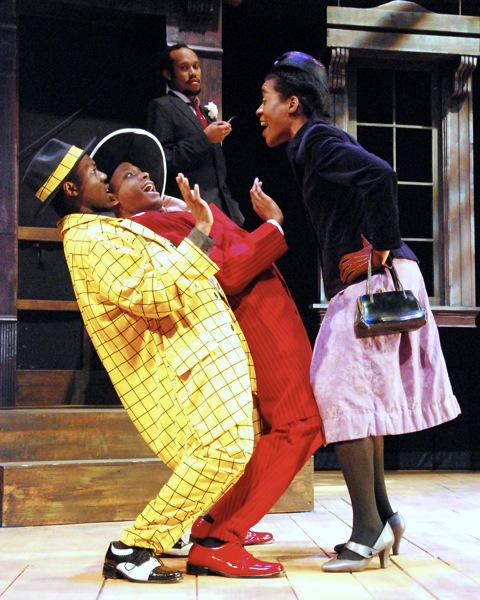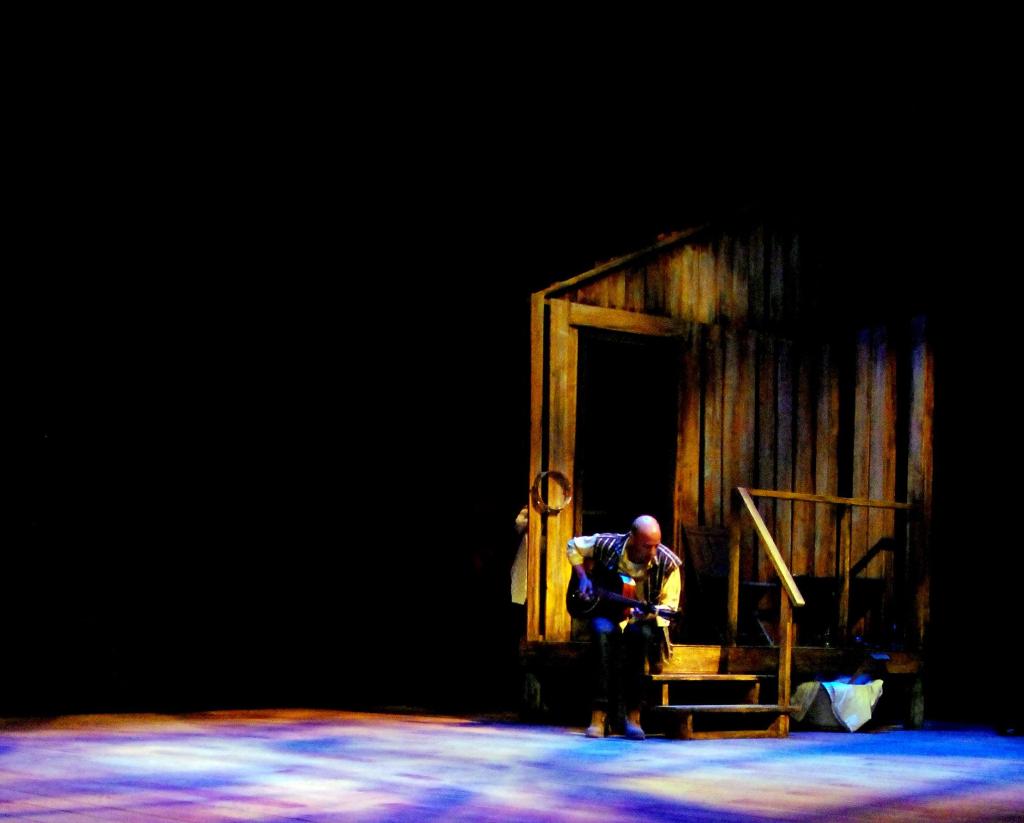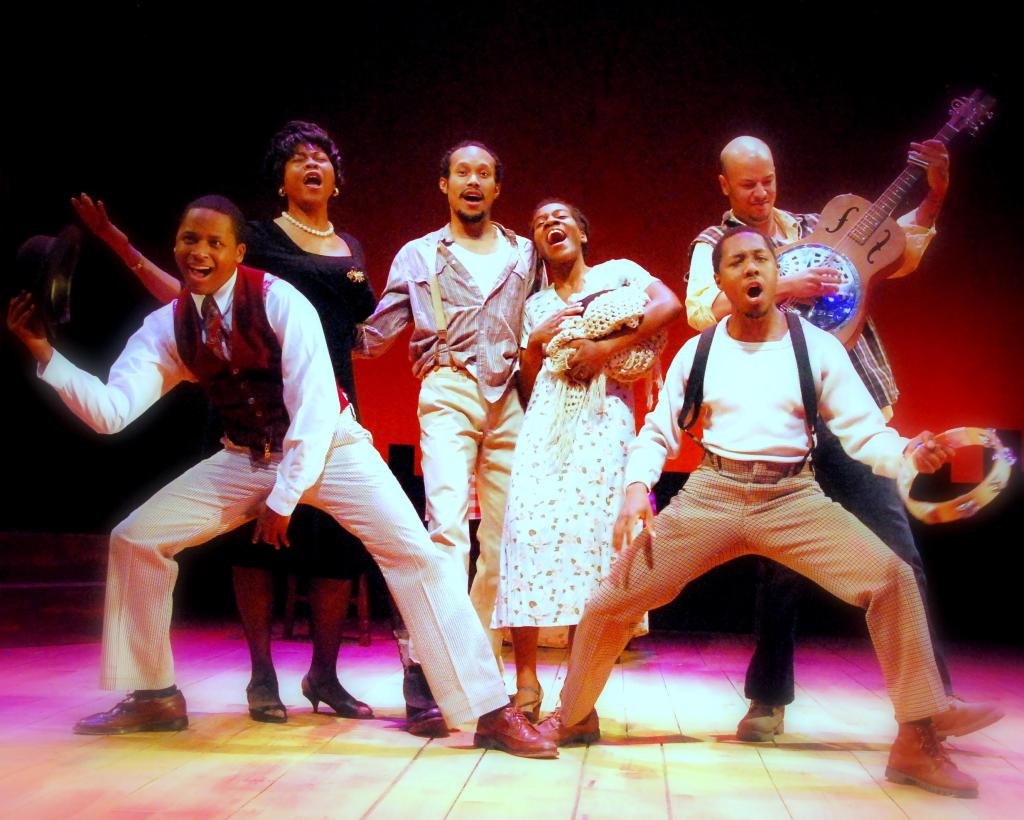BANGOR – For the next three weeks, theater audiences have the chance to see something unusual at the Bangor Opera House: African Americans.
For the first time in as long as anyone is able to remember — and likely for the first time ever — the Penobscot Theatre’s production of ”Spunk” features a cast of six African-American actors. The theater is presenting the play to mark Black History Month, and in doing so will help Bangor and eastern Maine reflect on its unique whiteness.
Maine is the whitest state in the nation, and Bangor among the whitest cities in Maine. The U.S. Census Bureau estimates that Maine and Bangor both are 95 percent white. By comparison, Portland is 91 percent white.
”It’s not the biggest production we’ve ever done, but certainly the material and the themes are nothing that Bangor has experienced. Maybe on a national tour on some level, but never at the Penobscot Theatre have we explored the African-American existence with an African-American cast,” said Scott Levy, the theater’s artistic director.
Written by George C. Wolfe, ”Spunk” is an adaptation of three stories by American folklorist and writer Zora Neale Hurston, a legendary contributor to the Harlem Renaissance of the early 20th century. Collectively, the stories in ”Spunk” deal with abuse and oppression, and celebrate the human ability to overcome and endure.
The piece incorporates music that binds the stories together, including the blues, choral narratives and dance. On stage in Bangor, the role of Guitar Man is played by Portland musician Samuel James, the only member of the cast from Maine.
The other five actors were cast through national auditions.
As Guitar Man, James holds the stories together with musical narration. He is an ever-looming presence who saturates the tenor of the show with a steamy steel and acoustic guitar. James is on stage for almost the entire show, and has just enough lines to make him nervous.
During the early run of the play in the 1990s, the role of Guitar Man was handled by Grammy-winning blues/jazz guitarist Keb’ Mo’, who used the play as a vehicle to launch a successful music career.
James, 31, feels lucky to have the chance to participate in a creative dialogue about racial diversity in his home state. He’s never acted before, but won’t allow his inexperience to temper his enthusiasm for the project.
”Like a lot of Maine, Bangor is lacking in diversity, so this to me was an opportunity to change that,” James said. ”Look, I’m from here. I grew up in Maine. I grew up in a town that was more rural than Portland, and I did get chased home by 10 kids a day yelling ‘nig—.’
”This is an opportunity to bring education to a place that normally would never get it. I do not want to sound high or mighty, but that is just the reality. There aren’t many black people in Bangor, so it’s great to get the opportunity to come to a place that happens to be close to my home and work toward this goal with a team of people.”
Hurston, who died in 1960, was a titan of 20th-century African-American literature, and stands as a model for writers such as Toni Morrison and Alice Walker. She published several books and dozens of short stories, and won a Guggenheim Fellowship to conduct ethnographic research. She is best known for writing the 1937 novel ”Their Eyes Were Watching God.”
The impetus for Levy’s decision to include an all-black play in the Penobscot season was the election of Barack Obama in November 2008, the first African-American president in U.S. history. But there were deeper, local undercurrents behind Levy’s strategy.
A few years before Obama’s election, the Penobscot Theatre presented ”A Christmas Carol” and cast a local child, who happened to black, as Tiny Tim. At the time, the theater also employed a black box-office manager.
”At least a half-dozen audience members told (the box-office manager) ‘You must be so proud of your son,’ ” Levy said.
In fact, the young actor was not related to the box-office manager. People apparently assumed they were related because they were both black, Levy said.
”I thought, ‘This is unacceptable,’ ” he said. ”It’s bad enough that Maine is the whitest state in the nation. But there is less racial diversity in a place like Bangor than in communities like Portland. So I just thought we had to do this.”
The theater’s process of educating its audience about the black experience in America started modestly with ”Driving Miss Daisy,” with one black cast member, in 2007.
But ”Spunk” is different altogether.
With a cast of six, it’s a very lively, musical show that explores the black experience in the early 20th century. As Hurston was deeply associated with the Harlem Renaissance, this play oozes with the slang and tempo of that place in those times. It’s richly ethnic in its language and music.
Levy hired Donya Washington to direct the show. This is her first time working in Maine.
Washington has found her experience in Bangor eye-opening and encouraging. From the outset, she has felt welcome. ”I come from a small town in upstate New York,” she said. ”It was a shock to the system coming back to that atmosphere where people will talk to you on the streets. It’s very friendly.”
Washington has created a show that broadly emphasizes the struggles that Hurston wrote about. On the surface, the play is about being black. But at its core, it’s about overcoming challenges.
”As culturally specific as Zora’s work is, at the same time it is universal. These are stories about people doing things that people do. My hope is that people who come to the play will see something culturally specific, and feel like it could be about them, no matter who they are or where they come from,” Washington said.
The play opened on Wednesday, and continues through March 7 in the downtown theater. It’s too soon to say how well it will do at the box office, but early ticket sales indicate strong community support, Levy said.
Levy received numerous grants to support the play, including $20,000 from the Maine Arts Commission, $15,000 from the National Endowment for the Arts and another $25,000 from Bangor’s Cultural Commission, along with smaller grants from local and statewide businesses, foundations and cultural councils.
Staff Writer Bob Keyes can be contacted at 791-6457 or at:
bkeyes@pressherald.com
Send questions/comments to the editors.






Success. Please wait for the page to reload. If the page does not reload within 5 seconds, please refresh the page.
Enter your email and password to access comments.
Hi, to comment on stories you must . This profile is in addition to your subscription and website login.
Already have a commenting profile? .
Invalid username/password.
Please check your email to confirm and complete your registration.
Only subscribers are eligible to post comments. Please subscribe or login first for digital access. Here’s why.
Use the form below to reset your password. When you've submitted your account email, we will send an email with a reset code.